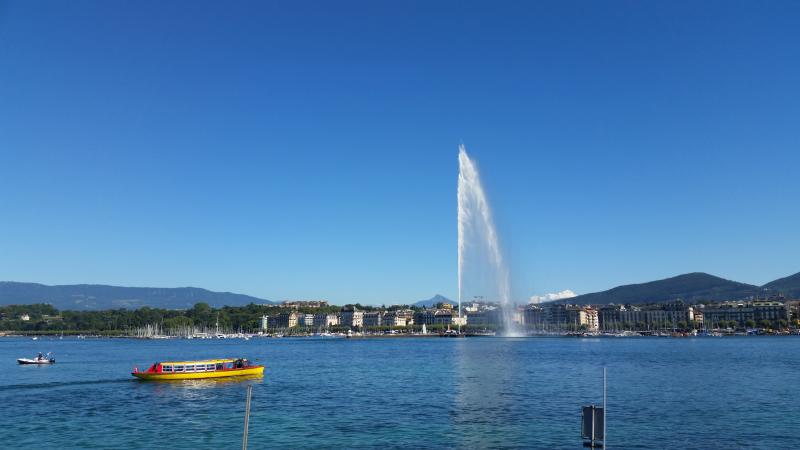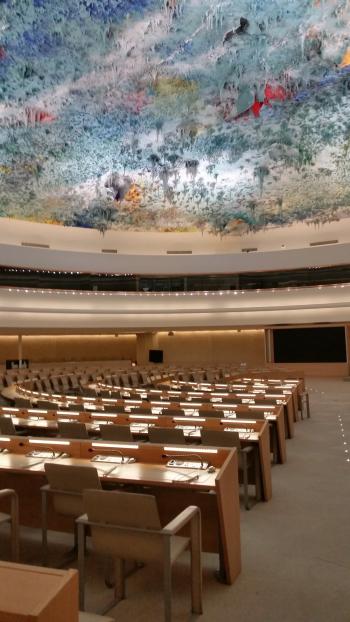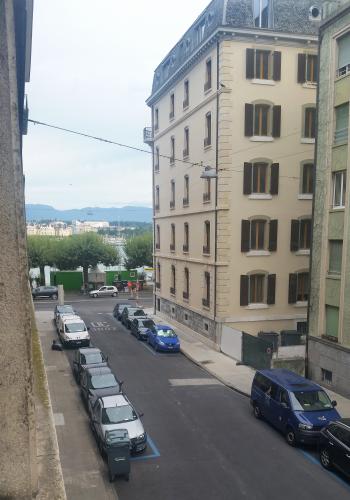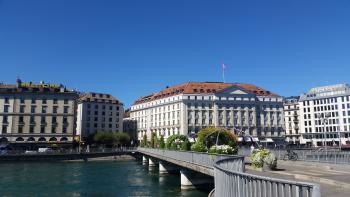A self-designed study-abroad stay in Switzerland
This article appears on page 34 of the April 2017 issue.
As a senior in college, I had yet to have a study-abroad experience. My friends had all done it, returning with their pockets filled with spare change in a foreign currency and a lifetime full of stories.
Knowing that my school schedule wouldn’t allow me to travel for an entire semester of study and that I would be booked for the majority of the summer, one rainy day in April I decided enough was enough. I would create my own study-abroad program, one that fit my schedule and my own interests. “Claudia’s Condensed Study Abroad” was about to begin!
Selecting a destination
The beauty of creating my own program was that I could go anywhere and do anything within the 3-week block of time that I had given myself, Aug. 5-27, 2016.
‘Where to go?’ was the first question. As a French speaker always looking for ways to practice the language (see Aug. ’14, pg. 38), I started looking for programs in French-speaking nations that appealed to my time frame, my interests and my budget. After several hours of Internet searches, I found a program that fit all three.
The University of Geneva’s Summer Courses (Maison des Langues, 5, rue De-Candolle; unige.ch), or the Cours d’Été, were celebrating their 125th year of operation. The university offers French-language programs for everyone, not just university students, from beginners to those at the most advanced level. Students are placed into the appropriate classes on the first day based on their comprehensive test results. Courses are three or six weeks long and run all throughout the summer.
Located in a city and a country I had yet to visit, this program offered a robust à la carte menu of guided excursions and an unbeatable price tag of CHF800 ($797 — or CHF1,500 for six weeks). Add to that the “plus” that the French department at my own university agreed to accept the Swiss course as a transfer credit and I knew I had found the right place!
Making plans
I would be flying from my summer internship in Seattle to Geneva, then flying back to college in Durham, North Carolina, but I managed to find great deals. I booked an Icelandair flight from Seattle, with only one layover, in Reykjavik, for $1,051 and selected Condor, Lufthansa’s budget airline that makes summer trips to and from Europe, to go from Geneva via Frankfurt to Baltimore for $450, with a quick jump on Southwest Airlines to Durham for another $100.
While I was hesitant to book budget airlines for fear of delays (I would be returning to the US just two days before my next term’s classes began), all went incredibly smoothly, and I was quite pleased with both legs of the trip.
From some friends I made on the flight from Seattle, I learned that Geneva’s airport provides travelers with a free 2-hour bus pass to get from the airport to town, which is available from a self-service kiosk in the baggage-claim area.
A place to stay
I had set my budget to $5,000 from start to finish, and it was turning out to be an ambitious goal, as I had yet to find housing. I decided to try Airbnb to find accommodations in Geneva’s notoriously tricky housing market. The university program did provide summer housing for an extra charge (about CHF700), but I wanted to be closer to the Old Town, so I was willing to go hunting on my own. I am so glad I did.
Searching Airbnb.com, I found Youri, a charming, polylingual host who rents out his studio apartment, located just a block from Lake Geneva’s famous Jet d’Eau. Being close to the waterfront ended up being my favorite part of the trip, as I often walked along the lake in my free time.
As an added bonus, Geneva’s famous summer festival was happening along the lakefront the first week I was there.
At a rate of $66 per night plus rental fees (a total of $1,550 for my 3-week stay), my little apartment put me in the heart of the action with a place to call home for a few weeks.
The apartment was tiny and rather old-fashioned, but I loved its location just steps from downtown, the lake and a tram stop, essential in getting around the city.
I bought a month-long unlimited tram ticket for CHF45, which was smart even for my 3-week stay. Traveling to school each day was effortless.
The program
The highlight of my trip was most certainly the program at the University of Geneva. Students came from all over the world to learn — a veritable United Nations just down the road from the real one. The largest population was German expats living in Geneva or other French-speaking cities who wanted to learn French.
In total, I met only two other Americans in the program, a retired gentleman who was taking a 6-week course at the beginner’s level for fun and a young woman who had moved to Geneva with her Swiss husband. By the end, I also had Spanish, Italian, Vietnamese, Iranian, Russian, Moldovan, Japanese, British and Polish friends.
The placement test I took on the first day put me into a class at the C1 level. The various levels, which ranged from A1 (basic beginners) to C1 (near complete fluency), corresponded to the levels of the prestigious DELF/DALF exams administered by the French government that certify levels of French-language proficiency. Many of my classmates were interested in taking this exam for academic or professional reasons.
All classes met every day from 9 a.m. to around 12 p.m. With class sizes of 12 to 17 students, my class was at full capacity, as were many others.
My instructor, Philippe Jarjat, was a native Frenchman who spoke more than five languages. Like many instructors, he was a regular of the Geneva programs, teaching during the summer before returning to his yearlong job at the University of Vienna.
He was a real stickler for grammar, and we did receive homework assignments and presentations to prepare. However, I could feel my French improving after just a few days.
In the afternoons, there was a choice from what seemed to be an infinite number of activities, classes, lectures and excursions all aimed at improving our skills in French. There were options for both beginners and advanced speakers, and I was never bored.
Each session’s options changed, so if you stayed for six weeks or went for a different block of three, different options would be available.
Afternoon classes, available at no extra charge, included phonetics and pronunciation help, a film class, a discussion class, a grammar class and lunchtime song and history lessons. I found some more beneficial than others, but having the options was very much appreciated.
Most classes were geared toward Swiss culture, as well. I went to lectures given by UN representatives on Swiss neutrality and attended talks on Swiss chalets, Jean-Jacques Rousseau (the famous philosopher of Geneva) and Genevois architecture.
Getting out and about
Paid excursions were also available, including a guided tour of Mont Salève, Geneva’s iconic mountain (ironically located across the border in France); a visit to the CERN supercollider project and a biking tour of the Swiss countryside; a train trip to visit the historic village of Nyon, which houses a museum on its famous china, one depicting life during the Roman empire and a final museum on the history of Lake Geneva, itself, and a guided walking tour of the historic church of St. Gervais led by a Swiss archaeologist.
While these excursions were wonderful, I also chose to go on a few adventures independently.
On my first weekend in town, I took a quick bus ride to visit the UN’s European headquarters as well as the International Red Cross & Red Crescent Museum. Thankfully, the two were right next to each other because I arrived at the UN only to find the tour I wanted to go on (there are a limited number each day) was booked up a half hour before it started.
So I headed across the street to the Red Cross headquarters, a beautiful museum that detailed the history of the organization during key moments in the world and offered a look at its work today (admission cost CHF15).
After visiting the museum, I headed back to the UN, arriving an hour before the start of the next scheduled tour, and I barely made it on. Tours are offered in multiple languages; I found myself on an English one, though I was the only American on the tour. It was a real treat to go through the Palace of Nations, the former home of the League of Nations, and see where many peace deals had been made (entry cost CHF12).
I also wanted to learn more about Switzerland’s famous watchmakers. For this, I took the recommendation of one of my classmates and traveled to the Patek Philippe Museum (Rue des Vieux-Grenadiers 7; patek museum.com), a watch collector’s dream.
I took the French tour; however, they offered one in English as well. Admission and the tour cost CHF15.
The tour was perhaps one of the most informative and engaging that I have ever taken on my travels, and I highly recommend it, but it was long — about an hour and a half — and, of course, was timed to the minute. You will definitely want to budget some extra time to explore their extensive collection.
A final tally
I knew, going into this trip, that Geneva had a high cost of living. However, upon my arrival I noticed that the local Swiss students would head to the grocery store and have a picnic in the park for lunch or go off the beaten track to find restaurants. Following their lead, in addition to preparing meals in my apartment with friends, allowed me to stay well within my budget, even when I did go out to eat.
My total expenses, which I carefully tracked on a spreadsheet, came to $4,400.
Overall, “Claudia’s Condensed Study Abroad” became a highlight of my education in French culture and language. It was such a delightful program in a safe and beautiful city, but I could never have dreamed that I would have so much fun or meet so many wonderful friends.
It’s never too late to study abroad!




